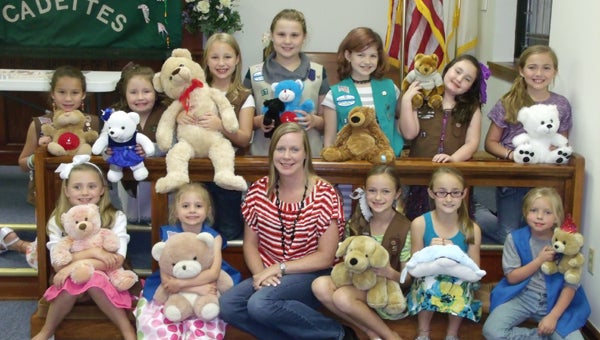Child Protect deals with more cases
Published 7:43 pm Friday, November 9, 2012

Jana Zuelzke of Child Protect is shown with Girl Scout Troop 37 of Thorsby who recently held a service project and donated teddy bears to the children’s advocacy center. Pictured are: (bottom row, left to right) Bailey Elliott, Jaden Bryant, Zuelzke, Claire Ellen Jolley, Emily Hagler and Neeley Carstensen; and (top row, left to right) Emma Till, Destiny Casale, Kylie Leach, Brynn Elliott, Zeni Coffee, Lexi Carr and Emma Carstensen. Not pictured: Morgan Connell.
Statistics from national non-profit organizations like Safe Horizon and Childhelp shed light on the prevalence of child abuse and neglect cases in the United States, but they might not help one understand how prevalent such cases are at home.
Just ask Jana Zuelzke of Child Protect, Chilton County’s child advocacy center located in Clanton.
Zuelzke can list all of the statistics—the ones for Chilton County and for the United States.
Every day, she and her co-workers see at least one child in their office who has become one of the more than 3 million reports of child abuse in the U.S.
“We had a 25 percent increase in the amount of cases that Child Protect was asked to intervene in the past year,” Zuelzke said. “We helped intervene in 104 cases of alleged sexual abuse, physical abuse and witnesses to crime as required by local law enforcement and DHR. Multiply that number by 10; that’s how many are going unreported in the county if Chilton County trends are similar to national trends.”
Specifically, Child Protect saw more physical abuse cases this past year than it normally does, according to Zuelzke, who said the economic downturn could have something to do with the increase.
“We kind of easily overlook it because we think it’s something that doesn’t happen in our county,” Zuelzke said. “I think some of it is being reported, but I’m quite certain some of it’s not, too.”
Assistant District Attorney Brandon Bates of the 19th Judicial Circuit of Alabama works with Child Protect in Clanton when child abuse cases involve a criminal prosecution.
Bates said he and his office work closely with Child Protect and law enforcement agencies from the time a child abuse investigation starts.
“Child Protect is very helpful,” Bates said. “We could not prosecute the cases as we do now without them. They’re extremely helpful in getting the information we need.”
Bates said Zuelzke and the other Child Protect employees are trained as expert professionals to testify in trials, and they are trained to interview children and determine whether their allegations in an abuse case are credible.
“They assist us in making sure that if allegations are made, that they’re truthful allegations,” Bates said. “The last thing we want to do as prosecutors is prosecute someone who is innocent.”






